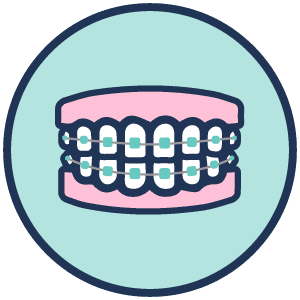Orthodontists worldwide use braces to treat all sorts of alignment problems. From overbites and underbites to crossbites and other malocclusions (the medical term for “bad bites”), all can be corrected with treatments using braces, lasting from a few months to a couple of years.
Although Invisalign and other clear aligner treatments have steadily risen in popularity over the past two decades, braces are still one of the best, most adaptable orthodontic treatments available today. Almost all healthy adults and children/teenagers with malocclusions can benefit from wearing braces, and the treatment is versatile enough to treat even the most complicated alignment problems.
In addition to such wide-ranging capabilities, recent material advancements have improved the look and feel of braces as well. Smaller, more attractive, and more comfortable than braces from years past, many patients today still choose braces over Invisalign for their minimal upkeep requirements and responsibilities.
If you have been considering orthodontic treatment for yourself or your child, you probably have questions about how braces impact a patient’s daily life. For example, one of the most common questions we hear here at Beverly Hills Orthodontics is, “Do braces affect speech?”
In this blog, we explore how braces can impact speech patterns, both during treatment and after. If you have any additional questions about orthodontic treatment, contact one of our offices in Beverly Hills, Studio City, Alhambra, or Downtown LA to find the answers.
Do Braces Affect Speech? Rarely
We can begin by reassuring you that braces will not negatively impact your speech during treatment. However, some patients report minor changes to speech when their braces are first attached.

The most commonly reported speech effects are minor lisping and struggling with certain sounds. In both cases, the solution is simple: practice speaking.
At the same time, orthodontic treatment can change the sound of your “head voice” (i.e., the sound you hear when you speak) without necessarily affecting how your voice sounds to others.
If you are at the beginning of treatment and feel that your voice has been affected by your braces, we have some suggestions:
- Record yourself speaking.
- Listen to the recording playback.
- Try to pinpoint which sounds you are struggling with.
- Repeat speaking any words aloud that contain the problem sound(s) to improve your articulation.
- Periodically re-record yourself and listen for progress. Repeat this process until you have eliminated the speech issue.
Almost all patients quickly adapt to their braces and overcome their speech issues within a few days. If your speech problems persist, there could be an issue with the braces themselves. Your orthodontist may have fitted them incorrectly or used improper wires. To avoid fitting issues, you should always seek orthodontic treatment from a trusted, licensed orthodontist.
Properly performed orthodontic treatment will not disrupt your speaking ability. In fact, braces can actually improve your speech, as well as other oral functions.
How Braces Improve Speech and Other Oral Functions
Moderate-to-severe malocclusions can negatively impact oral functions, including speech. That’s because the physical production of human speech is a complicated process in which multiple body parts must work in harmony.
In simple terms, your lungs produce air to create noise, your larynx manipulates the air via vocal cords to form the intended sound, and body parts in the mouth and nose (the tongue, soft palate, and sinus cavities) articulate the sound to form specific words. When these body parts can’t work together to form those intended words, it results in a speech impediment.
Speech impediments are complicated issues that are caused by multiple factors, including genetics, brain function, and motor control. Braces will not improve speech impaired by mental or motor functions. However, braces can improve speech clarity and reduce lisping levels influenced by improper jaw and tooth alignment.
The chart below provides details on how correcting specific bite problems can improve speech:
| Bite Issue | Orthodontic Treatment Benefit |
|---|---|
| Irregular Incisors | Clearer pronunciation of “t” “d” and “s” sounds |
| Irregular Upper Anterior Teeth | Clearer pronunciation of “p” ”b” and “m” sounds |
| Open Bite | Lower lisping levels and clearer pronunciation of “s” “z” “t” ”d” ”n” and ”l” sounds |
| Diastema (i.e., Tooth Gaps) | Lower lisping levels |
| Cleft Palate | Overall clearer speech and better pronunciation |
By correcting jaw and tooth alignment, braces improve other oral functions as well, including biting and chewing. Proper alignment also makes oral care easier and more effective, leading to numerous health benefits.
So, to finally answer the question, “Do braces affect speech?”—Yes, but only in a positive way!
Have More Treatment Questions?
Call Beverly Hills Orthodontics Today
If you are considering orthodontic treatment but are concerned that braces may change your voice, we have good news: braces will not negatively impact your speech.
Although you may think you sound a bit funny at the beginning of treatment, patients quickly adjust to their braces and learn to speak clearly within a day or two. Moreover, braces have been shown to improve mechanical speech problems, so you may sound even better once treatment is complete!
At Beverly Hills Orthodontics, we create a safe and welcoming environment for all our patients. No matter what questions or concerns are making you anxious, our team is here to give you answers and put your mind at ease. BHO’s founder, Dr. Monica Madan, graduated from the #1-ranked orthodontic program in the country and uses her expertise to craft holistic treatment programs that put patient comfort and lifestyle preferences above all else. Schedule a consultation today to learn how BHO can improve your smile!
